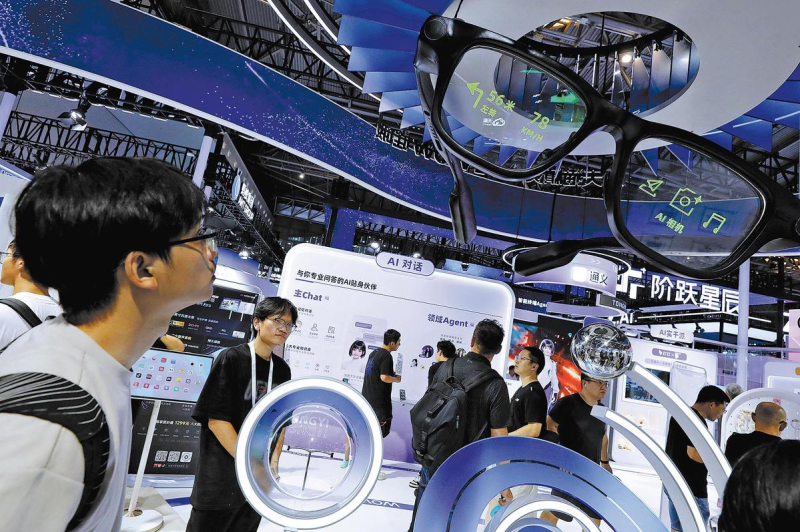AI integration, innovative add-ons brighten smart glasses outlook

Visitors gather at a company's booth during a smart glasses expo in Shanghai on July 28. FANG ZHE/XINHUA
China's smart glasses market is believed to be experiencing a breakout this year, driven by rapid adoption of artificial intelligence-powered devices and surging consumer interest, said industry experts.
Hangzhou, Zhejiang province-based smart eyewear manufacturer Rokid announced earlier last month that the company's star product, Rokid Glasses, has already sold 300,000 units. "Sales are no longer a concern this year — our primary focus is now on ramping up production," said Zhu Mingming, founder and CEO of the company.
Yang Kexiao, head of innovative hardware at Shenzhen, Guangdong province-based smart glasses producer Rayneo, also noted a strong uptick in first-half product shipments. First-time buyers accounted for 81 percent of purchases, while the company also saw a 314 percent year-on-year increase in monthly active users, Yang said.
Elsewhere, according to activation data from tech heavyweight Xiaomi, its newly launched AI glasses, released in late June, had surpassed 30,000 active users by July 2.
Data from market consultancy IDC revealed that 494,000 smart glasses units were shipped in China during the first quarter of 2025, a 116.1 percent year-on-year increase.
Globally, IDC forecasts that smart glasses shipments will reach 14.52 million units this year, up 42.5 percent year-on-year. The Chinese market alone is expected to account for 2.91 million units, up 121.1 percent year-on-year.
As a major emerging sub-sector, AI glasses now dominate the smart glasses market, with shipments of AI-powered models surging to 78 percent of total sales in the first half — a sharp rise from just 46 percent a year earlier and from 66 percent in the latter half of 2024, according to data from research company Counterpoint.
"The most significant highlight of the smart glasses industry's development this year lies in the deep integration of large AI models and AR (augmented reality) technology," said Wang Liansheng, an expert at the China Electronics Standardization Association, in an earlier interview with Securities Daily.
Wang added that the next two years will be a critical period for the commercialization of smart glasses, where ecosystem development capabilities will be a key factor determining whether companies can achieve scalable growth.
A research note from Founder Securities also pointed out that the combination of lightweight design and multimodal interaction capabilities is making AI glasses an ideal form factor for AI integration.
"This momentum, coupled with advancements in lens technologies, is driving simultaneous growth in both sales volume and product pricing," it said.
On the AI front, major players are incorporating proprietary large language models into their devices.
For example, Xiaomi AI Glasses feature an in-house XiaoAi assistant; Huawei's Eyewear 2 is powered by its LLM Pangu; while Rayneo's X3 Pro has partnered with Alibaba's Qwen for a custom multimodal AI solution.
Others are leveraging a combination of major LLMs. Rokid Glasses currently integrate multiple models, such as Qwen, DeepSeek, Doubao and ChatGLM. And Skyworth's first full-scenario AI smart glasses similarly support several mainstream models such as DeepSeek, Doubao and Qwen.
Enabled by AI integration, the growing sophistication in voice and image recognition is creating richer human-machine interaction for smart glasses, said Ye Qingqing, an analyst at IDC China.
"Going forward, AI-powered smart glasses are expected to unlock more practical and cost-effective applications," Ye said. "For the AI ecosystem, these glasses represent a highly efficient hardware endpoint, and both industries will mutually reinforce each other's growth."